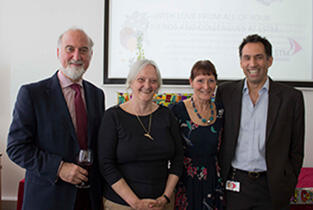
LSTM this week bids a fond farewell to Dr Wendi Bailey, head of the Clinical Parasitology Laboratory, who retires after more than 40 years of service.
Dr Bailey, who has run the lab since 1974, was one of the driving forces behind it being accredited last year by Clinical Pathology Accreditation (UK) Ltd, unusual for a non NHS lab and proof that it is meeting the highest standards of diagnostic practices. The lab provides services for the identification of human parasites to clinics, hospitals and health centres across UK and Ireland, with over 4,000 samples examined every year.
Joining LSTM as a technician in the 1960s Dr Bailey remembers a much smaller organisation than today’s internationally renowned research institution, and as she recalls, things have certainly changed a great deal: “There was one particularly bad winter when special dispensation had to be sought so that women working at the school could wear trousers. There was a memo from the Dean of LSTM, Professor Brian Maegraith, giving us permission to wear trousers because it was so cold!” She also remembers her first overseas visit: “in 1978 I got the opportunity to travel to Nigeria, at that time few women were sent overseas as it was assumed ( and I was told) that they were more likely to get home sick, but I asked to be given the chance. I think I was in the right place at the right time and still enjoy working in the rural tropics.” In fact during her career at LSTM Dr Bailey has travelled extensively assisting in the improvement of diagnostics and lab conditions in resource poor settings in Africa and Asia, and between 1982 and 1984 she was seconded to the New Dubai Hospital in the UAE to establish a diagnostic parasitology laboratory service.
Dr Bailey gained her MSc for work developing an anti-body detection test for strongyloides working with the ex-Far Eastern Prisoners of War (FEPOW). After spending two to three months in Uganda twice a year between 1985 and 1992, working at improving diagnosis of sleeping sickness she used the collected data to gain her PhD.
As a result of her experience in helping to set up laboratories and train staff in diagnosing parasitic infections she became involved with Chester Zoo (UK) veterinary department who, in 2005, asked her to travel to a wildlife sanctuary in Cameroon to conduct a survey of non-human (and human) primate parasitic infections. . Since then she has been working with the Pan African Sanctuary Alliance (PASA) and the Orangutan Foundation, and travels during her periods of leave to the annual veterinary workshops in different African countries and the Far East respectively where she runs the parasitology sessions.
Working with Dr Bailey since his arrival at LSTM, Dean of Clinical Sciences and International Public Health, Professor David Lalloo said: ““Wendi was one of the first people that I met when I joined LSTM and it was immediately obvious that I had come to the right place. Her sense of fun, hard work, and willingness to take anything on have made her a delight to work with and she has been at the heart of the clinical service that LSTM provides.
“It may not always be obvious from inside the organisation but the diagnostic laboratory is internationally recognised as one of the best that there is. That reputation can be attributed to Wendi; over 40 years here, she has been instrumental in developing the diagnostic laboratory and played a major role in developing national and international standards in parasitology. She has also used that expertise, and the experience gained from her PhD in trypanosomiasis to help improve to diagnostic services in resource poor settings and it has always been clear that her heart is in the field- I have never seen Wendi happier than when travelling for hours in the back of a Landrover to look at a rundown laboratory in Uganda.
“Her dedication to teaching has meant that many people, both UK laboratory personnel and LSTM students, have learned most of what they know about diagnostic parasitology from Wendi. Few individuals have made such a major contribution to LSTM and everyone here wishes we all the best in what I am sure will be an active retirement”